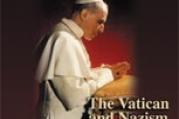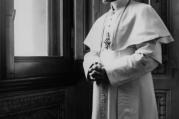Click here if you don’t see subscription options


Ambiguity
I found Robert A. Krieg’s highlighting of the ambiguity of The Vatican Concordat With Hitler’s Reich (9/1), a very interesting and important consideration. I find it all the more ambiguous because Pius XI was certainly not a pope whose principal aim was the preservation of ecclesiastical structures and religious activists to the neglect of social justice. Six years before he signed the concordat with Hitler, he had condemned the ultra-right French political movement Action Franaise, whose aim was to destroy the French Republic and restore the monarchy, at least for a time. The anticlerical laws aimed at the French Catholic Church in the early 1900’s would have given Pius XI a good excuse to use politics in the service of religion; for the monarchy, or an authoritarian government like that of Napoleon, always accorded a privileged position to the church. But Pius XI condemned the movement because it used religion in the service of politics. At the end of his life Pius XI asked the American Jesuit apostle of interracial justice, John LaFarge, S.J., to prepare an encyclical on the Jews and anti-Semitism. He died before it was made public, and Pius XII never saw fit to promulgate it.
Mr. Krieg points out clearly that the ecclesiology of the time was dominated by the conception of the church as a perfect society, the protection of whose institution and organization was the principal duty of the hierarchy. The French Catholic philosopher Jacques Maritain, who, to his profound regret, had let himself be duped into an ambiguous and distant relationship with Action Franaise by his conservative and traditional spiritual directors (Dom Delatte, O.S.B., Father Clerissac, O.P., Father Garrigou-Lagrange, O.P., and others) came to realize and to admit his navet, and supported the pope’s condemnation of the movement. He was never forgiven for this by the powerful members of the traditional ecclesiastical hierarchy.
In his last book, On the Church of Christ: The Person of the Church and Its Personnel, Maritain maintained that the person of the churchwhich Krieg identifies as mystery or sacrament, as people of God, as the body of Christ, as collegial community and as servantthis church is indefectibly holy; but, Maritain added, its personnel is not. It is composed of fallible, imperfect men, who, as Mr. Krieg mentions, all too often placed protecting the institution and its reputation above its mission to proclaim the truthor defend the victims of sexual abuse. Recently a French scholar of Jacques Maritain wrote to me that the present tendency of Catholic neoconservatives (like Michael Novak, George Weigel, Deal Hudson and others) to use religion to promote certain political programs of the present American administration on economic justice, war and sexuality strikes him as a kind of maurrassisme amricain, and I think he’s right.
Bernard Doering




Certain Uniformity
Among the items in Signs of the Times on Aug. 4 is a notice that the Vatican says flexibility allowed on posture after Communion, even though the General Instruction of the Roman Missal, No. 43, states that all are to remain standing until the end of Mass. The reason given for this statement by the Congregation for Divine Worship and the Discipline of the Sacraments is worth noting and should be observed as a principle regarding other postures at Mass, such as standing for the eucharistic prayer: The mind of the prescription of the General Instruction of the Roman Missal, No. 43, is intended, on the one hand, to ensure within broad limits a certain uniformity of posture with the congregation for the various parts of the celebration of Holy Mass, and on the other, to not regulate posture rigidly....
That explanation is in accord with the much-ignored principle of the Constitution on the Sacred Liturgy, No. 37, which insists that even in the sacred liturgy the Church does not wish to impose a rigid uniformity in matters which do not involve the faith or the good of the whole community.
Charles E. Miller, C.M.




